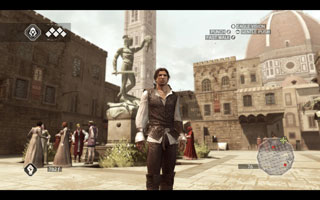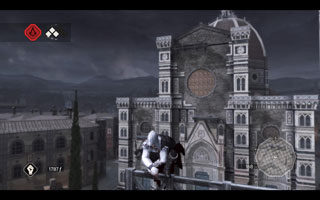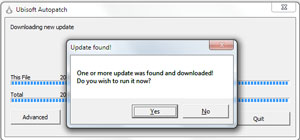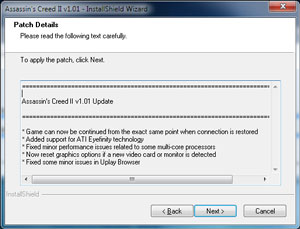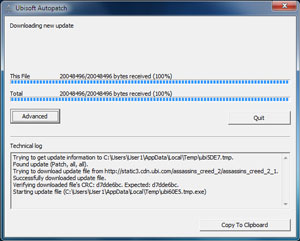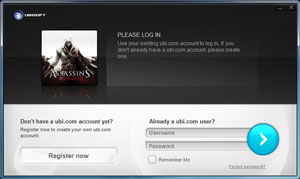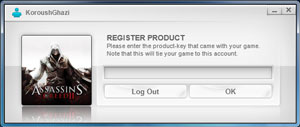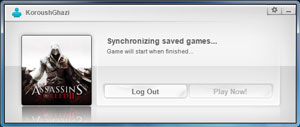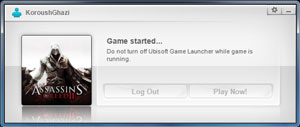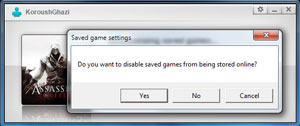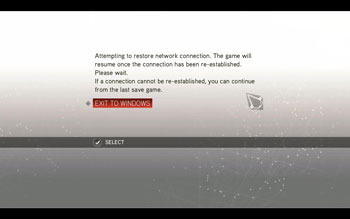Assassin's Creed 2 DRM
[Page 1]
Introduction
Assassin's Creed 2 (AC2) was delayed for release on the PC, coming roughly four months after its release on the XBox 360 and PlayStation 3. Unfortunately, it seems that aside from the delays, AC2 will be remembered primarily for introducing a new form of copy protection/Digital Rights Management (DRM) developed by Ubisoft. In the face of the widespread hysteria and misinformation on this topic, I've prepared this page in the hopes of providing some factual information based on personal experience with the system in question.
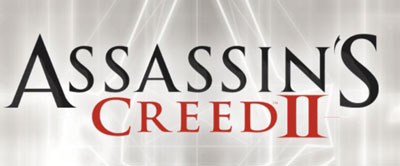
Assassin's Creed 2 - Gameplay
Before entering into any details regarding the copy protection system, I've prepared a short HD YouTube Video demonstrating the in-game options and some basic gameplay at maximum possible settings. I've also prepared a second HD YouTube Video which demonstrates more complex gameplay at later stages of the game, again at maximum settings.
Additionally, some screenshots are provided below to let you have a closer look at the game's image quality:
While there are slight improvements and additional effects in AC2, in general the game looks very similar to the original Assassin's Creed, and performs around the same. This is not surprising given the game was originally designed for the popular gaming consoles, which have 2005-era hardware in them. As such, even modest gaming PCs should be able to run AC2 without any major difficulty. The underlying gameplay is also very similar to AC1 as you can see from the video, although the characters feel more fleshed out, the game world feels larger, and there is greater variety of missions and available actions. I haven't completed the game at this point so I can't provide any more details regarding how the game ranks overall, but it has garnered much praise on other platforms. In short it appears that if you enjoyed AC1, you will enjoy AC2.
Ubisoft's New DRM
The official details of the new copy protection/DRM implemented in Assassin's Creed 2 are provided here, but basically it requires that you have a permanent Internet connection to play the game. Note however that it has no install limits and does not require keeping the DVD in the drive to play. This DRM has not been secretly introduced - it was announced several months ago by Ubisoft, and is noted prominently on the front of the AC2 retail box, as shown here.
How does it work in practice? Below is a blow-by-blow rundown:
1. The game is installed as normal, however during installation an Ubisoft Game Launcher component is also installed. I can confirm through the use of the AutoRuns utility that this protection method does not appear to install any new startup services, background drivers or other programs on your system. The Ubisoft Game Launcher only loads when you launch Assassin's Creed 2, and does not need to stay resident at any other time.
2. Assassin's Creed 2 can be launched without requiring the DVD in the drive. When launched, the Ubisoft Game Launcher will first check for any updates such as patches, and if found, prompt you to install them, showing you any details as required - see screenshots below:
If you wish to view more details of the update, click the Advanced button as shown below:
3. The Ubisoft Game Launcher requires that you login with an Ubisoft Account, which you can create for free. Once you have created/logged into your Ubisoft account, the first time you run the game you will be prompted to enter the serial number for AC2. This number will then be linked to your Ubisoft account, which means you can login and play the game on any one machine at any time with no install limits. Note that login can be made automatic the next time you launch AC2; you don't need to enter the username or password each time you launch AC2. Screenshots are shown below:
4. Once logged in and verified in this manner, the game itself begins to launch. See the screenshots below:
Note that the entire process usually takes only 5-10 seconds in total from clicking the game launch icon to seeing the AC2 in-game splash screen, similar to the login time required for Steam games. You can reduce this login time by choosing not to have your saved games stored online. This is done by clicking the small cog icon in the top right corner of the Ubisoft Game Launcher window, as show below:
5. At this point the game launches and there is no further sign of DRM, nor any other requirements other than having to keep an active Internet connection. This is an anti-piracy measured designed to check regularly with Ubisoft servers to make sure the game has not been illegally altered or running an invalid serial number, similar to any multiplayer game.
In the several hours during which I have played Assassin's Creed 2, I have not once experienced any hiccups or issues resulting from the DRM. There are no strange pauses or anything else unusual. However I have a relatively fast and stable connection, so to simulate an Internet outage, I unplugged my ADSL line temporarily during normal gameplay to see what would happen. After around 5 seconds the following screen appeared:
I then reconnected the ADSL line, and again within around 5 seconds the game resumed from exactly the same point at which I had been before. The game also automatically saves itself regularly at various checkpoints to prevent loss of progress for whatever reason. As noted earlier, these saves can be stored online or on your drive depending on your preferences.
Finally, once the game is exited, if the Ubisoft Game Launcher window is still open it can be closed. A simple check of Task Manager or the Process Explorer utility shows no traces of any resident programs.
I Don't Like This DRM!
Let's be clear: like most people, I don't particularly like any form of DRM. However the reality is very different from the pro-piracy propaganda you may read on sites like Torrentfreak. Ubisoft's new DRM appears to be relatively unintrusive and does not affect system performance or stability in any way. It does have the benefit of removing install limits and disc checks, and provides online storage of saved games. Recall if you will the way in which people were calling for boycotts and dreaming up all sorts of nightmare scenarios when Activation was introduced in Windows XP, or the early days of Valve's Steam online gaming platform. In the end these people were proven wrong - misinformation and hysteria are of no benefit to anyone.
Obviously the major drawback of this system is that if you live in an area where your Internet connection is not stable, it may impact on your ability to play this game. If you're seriously concerned about this, I urge you read various accounts from different owners of the game. Wait for any potential problems to be smoothed out before purchasing the game yourself, or if you're certain your Internet connection is not up to it, don't buy the game at all. Note that on the day of its release, the protection system has already been patched to improve the way it operates, so it is clearly evolving.
Bear in mind however that without a doubt, this protection system has been forced upon us solely due to rampant piracy of PC games. My PC Game Piracy Examined article provides all the relevant facts if you're interested. Single-player PC games in particular are now pirated to such a degree that without protection, they are simply not viable for release on the PC platform anymore. All offline methods of protecting single-player games simply do not work.
For several years Ubisoft has been experimenting with DRM. The first Assassin's Creed was used to passively collect data on the general level of piracy of the game, and confirmed that piracy was being conducted on a massive scale. Then the most recent Prince of Persia game was released without any form of DRM, and in the face of massive piracy, confirmed that simply removing DRM is not a viable solution. Indeed many other games without any form of intrusive DRM have been pirated so heavily over the years, it counters the myth that people pirate games due to DRM. Valve's Steam has also proven unsuccessful in protecting single-player PC games, as it is easily removed and pirated copies abound, the latest example being the 'Steam-only' Aliens vs. Predator release. Steam is very profitable for Valve as a reseller of other companies' games, but is not a secure protection system for single-player games. The end result is that sales of single-player PC games are now a fraction of what they used to be, and many, many times less than on the consoles, despite the technical superiority of the PC platform and the roughly equal install bases of gaming PCs and consoles.
Contrary to popular belief, PC game piracy is not a victimless crime. Games development is an extremely expensive, highly risky, lengthy and complex process. Major games now cost tens of millions of dollars and thousands of man hours to develop, and securing that sort of investment in the face of rampant piracy is increasingly difficult. Piracy has already skewed games development towards consoles in recent years, and has resulted in the death of PC exclusives which take full advantage of the power of the PC as a gaming platform. Even those games which are ported over to PC are typically delayed to ensure that piracy of the PC version doesn't undermine sales on the consoles, and they also exhibit signs of their console heritage.
In the face of rampant game piracy, it is now quite likely that quality single-player PC games will soon be a thing of the past, and multiplayer-focused games, especially MMOs, will become the PC's only viable niche. We have only the pirates - people who believe they are entitled to other peoples' work without contributing anything towards it - to thank for this. All the usual excuses for pirating games do not stand up to scrutiny: good games get pirated more, not less; games with demos are pirated just as much as those without; games without DRM are pirated rampantly; cheaper games are pirated just as heavily as more expensive ones; and whether a small struggling studio or a major company releases a game, the piracy rates are equally as high across the board. These facts, along with the incorrect claim that "DRM doesn't work", are covered thoroughly in my PC Game Piracy Examined article.
If you don't wish to accept this new form of DRM, that's perfectly understandable. The solution is simple: do not purchase Assassin's Creed 2. However do not pirate it either. There is absolutely no excuse to pirate AC2 or any other game; a game is a luxury item and not a necessity. Piracy will simply force Ubisoft and other companies to either try even more intrusive forms of DRM, or abandon the PC as a platform for major games, particularly quality single-player games.
Make no mistake, the ultimate victim of piracy is PC gaming itself. PC gamers are slowly killing the hobby they profess to enjoy. In many ways, it may already be too late. Ask yourself this: are pirated games really worth risking the continued decline of the PC as a gaming platform?
Update: Note that misinformed reports of this new DRM system being cracked are false. Any pirated versions available cannot be played without glitches, and there are confirmed reports that they are all incomplete - i.e. the game cannot be played all the way through. The details are provided here. As such the protection system has already been sufficient to prevent successful day-zero piracy of AC2.
Update 2: Recently some European players of AC2 could not connect with the authorization servers to play AC2. Ubisoft has confirmed that this temporary outage was actually a DDOS (Distributed Denial of Service) attack which lasted around 7 hours. Clearly, there are people out there who do not wish legitimate purchasers to play this game and have no qualms about inconveniencing them to supposedly make a "point" about this DRM.
Update 3: Ubisoft has sent an email to all owners of Assassin's Creed 2 and Silent Hunter 5 providing compensation for earlier outages of their DRM servers caused by DDOS attacks. Depending on the edition you purchased, the compensation ranges from free additional content to a free game such as HAWX or Prince of Persia.
Update 4: One month since AC2 was first released, a new successful crack for its DRM has become available. Various accounts place the crack at approximately 90-99% complete, so essentially the DRM held up for over a month before being effectively cracked.
Update 5: As promised by Ubisoft, after a period of time the requirement for this DRM to remain online at all times while playing AC2 has been patched out of the game. You now only need to be online during the initial activation, and for authentication at the start of each session, after which an active Internet connection is no longer necessary during gameplay.

